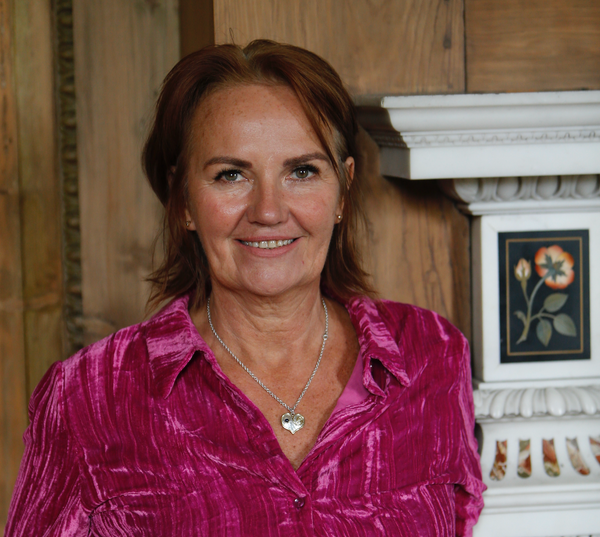CEO of Wentworth Woodhouse awarded an OBE in the King's Birthday Honours list





Sarah McLeod, the CEO steering the regeneration of Wentworth Woodhouse in Rotherham, arguably the UK’s greatest heritage restoration challenge of a generation, has been awarded an OBE for her services to the heritage sector.
She was one of over 1,000 people recognised for their service and achievements in the King's Birthday Honours list, released on June 15.
“I am honoured and so proud to receive an OBE for my work. I feel incredibly lucky to work in heritage and am very grateful to everyone who has given me opportunities and supported me throughout my career,” said Sarah.
“For me, this award represents the hard work of everyone who works to protect and restore our historic places.”
Sarah joined Wentworth Woodhouse Preservation Trust as CEO in May 2017 after having to be persuaded to apply as “I didn’t think I knew enough about country houses.”
It was, she says, both the biggest challenge, and the biggest risk, she had ever undertaken.
Weeks earlier, the Trust, spearheaded by Dame Julie Kenny DBE DL, had bought the dilapidated Grade I listed Georgian country house in Rotherham for £7m.
The task ahead was described in the sector as the ‘UK’s greatest heritage
restoration challenge of a generation’. The estimated cost was £130 million and every penny needed to be raised over the coming decades.
The Georgian architectural masterpiece was crumbling. There were numerous buckets to catch rain pouring in through the vast roofs. Sarah McLeod had five staff, one phone line, no internet connection and one ancient vacuum cleaner to work with.
The Trust’s vision was not only to restore the house and create a lasting legacy for the people of South Yorkshire, but to transform it into the UK’s most accessible heritage attraction, where all abilities, backgrounds and ages would feel welcome.
Seven years on, the plan is working. The house is boosting the region’s economy, providing jobs, nurturing skills and enabling local people to participate in new creative and cultural activities.
Sarah McLeodhas developed and guided the Wentworth Woodhouse Preservation Trust from a start-up to a busy trading business now turning over £3.5m a year and growing, and has successfully raised funding for, and delivered, almost £30m of capital works. She also spearheaded and launched both the Trust’s overarching Masterplan and its Cultural Strategy, creating over 100 new paid jobs and over 300 volunteer roles,
During this period WWPT has won numerous awards and gained a reputation as an exemplary project for engagement, inclusion and cultural innovation.
I’m so glad I took on the challenge,” says Sarah. “Wentworth Woodhouse is so much more than a restoration project; We are creating something really special, and my role has allowed me, and the people I work with, to be really creative and innovative in our thinking.We do things differently to other country houses and we are very proud of that.”
Sarah came well-equipped with a wealth of experience gained from her role as CEO of the Arkwright Society, located at Cromford Mills within the Derwent Valley Mills World Heritage Site, which snakes 15 miles through Derbyshire along the course of the River Derwent.
The historic mills at Cromford include B18, the world’s first ‘modern factory’ which played a leading role in the Industrial Revolution
During her seven-year tenure as CEO, she raised over £10 million for projects across the estate and restructured and modernised the organisation to aid financial sustainability.
She led a £7 million project to provide 8,000sq ft of workspaces for creative industries and a new visitor centre in the largest building on the site, B17. The project opened in March 2016 and won the EU Europa Nostra Award for Cultural Heritage Conservation 2017.
Sarah had joined The Arkwright Society in 2001 as an administrator for their Heritage Lottery Fund (now known as the National Lottery Heritage Fund) project and rose to Chief Executive within nine years. Her commitment to the NLHF remains strong. She now sits on its Northern Committee, assisting with decisions on grant-giving for applications seeking £250,000 to £5m.
Her career also includes three years as the Founding Chair of the Heritage Trust Network, the UK’s umbrella organisation which connects not-for-profits rescuing and managing historic buildings and places. And for the last 12 years, Sarah has been an active course contributor to the MSc in Building History at Cambridge University, a role she particularly enjoys.
After 23 years at the helm in heritage, she is passionate about the sector’s role as saviour and protector of historic places and the career opportunities it presents to people of all ages.
“When you work in heritage regeneration, you have a duty to treat our history with absolute respect and integrity, telling stories of the past whilst giving these wonderful buildings new purpose, and connecting them to current and future generations,” she commented.
“I encourage anyone to consider working in what I know is a very supportive sector, one in which people share their knowledge, expertise and information with generosity of spirit.”